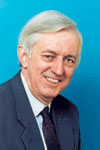Paul Rogers
Paul rogers is based at the Department of Peace Studies at Bradford University.
Biography
Paul Rogers has continued to focus on trends in international conflict, developing an analysis of the linkages between socio-economic divisions, environmental constraints and international insecurity. Much of his work concentrates on western military responses to regional conflicts and political violence, and he is also concerned with those trends in political violence likely to have the greatest impact on wealthy industrialised states. Since the New York and Washington attacks he has been analysing US responses, especially in relation to Afghanistan, Iraq and al-Qaida and its affiliates. The second edition of his book, Losing Control: Global Security in the 21st Century (Pluto Press, 2002), has been translated into Japanese, and an Italian translation is pending. Paul wrote a widely-quoted report for the Oxford Research Group, The War on Terror: Winning or Losing? that was published on the second anniversary of the 9/11 attacks. His most recent book is A War on Terror: Afghanistan and After, (Pluto Press, January 2004). During 2003, Paul contributed over 300 radio and TV interviews to radio and TV stations and networks across the world, he wrote for The Independent on Sunday, and continued his weekly column on international security for the OpenDemocracy web journal.[1]
Affiliations
- On the International Research Council of the International Center for Terrorism Studies within the Potomac Institute for Policy Studies.
Selected Publications
- Rogers, P: A War on Terror: Afghanistan and After ISBN 0-7453-2086-4 pbk; 0-7453-2087-2 hbk Pluto Press, 2004, 210 pp.
- Rogers, P: Hans Gunter Brauch, P.H.Liotta and Paul Rogers,"Introduction: Security and Environment in the Mediterranean", pp 27-34, chapter in:Security and Environment in the Mediterranean: Conceptualising Security and Environmental Conflicts, edited by Hans Gunter Brauch, P.H.Liotta, Antonio Marquina, Paul F. Rogers and Mohammad El-Sayed Selim, 1,034 pp., Springer-Verlag, 2003
- Rogers, P. Losing Control: Global Security in the Twenty-First Century, Pluto Press, London, 2002.
- Rogers, P: ‘Limitations on Joint Warfare: The Impact of the Proliferation of Conventional Weapons Technology’, chapter in The Changing Face of Military Power, Andrew Dorman, Mike Smith and Matthew Uttley (eds), pp. 45-71, Palgrave, London, 0-333-91892-4
- Rogers, P: ‘Political Violence and Global Order’, chapter in Worlds in Collision: Terror and the Future of Global Order, Ken Booth and Tim Dunne (eds), pp. 215-225, Palgrave, London, 2002, 0-333-99804-9.
- Rogers, P: ‘The United Nations and the Promotion of Peace’, Medicine, Conflict and Survival, Vol 18, 2002, pp. 110-119.
- Rogers, P, Whitby, S and Dando, M: Biological Warfare Against Crops, Scientific American, Vol. 280, No 6, pp 70-75, June 1999.
- Rogers, P, Lessons to Learn, The World Today, pp 4-6, August/September 1999.
- Rogers, P., and Ramsbotham, O: Then and Now: Peace Research - Past and Future, Political Studies, Vol. 47, No 4, September 1999.
- Rogers, P, Learning from the Cold War Nuclear Confrontation, in Deconstructing and Reconstructing the Cold War, Dobson, A (ed), Ashgate, pp 202-225, 1999.
- Rogers, P, A World Not Yet Safe From Weapons of Mass Destruction, in A Labour Peace Policy for the Millennium, Allaun, F (ed), Labour Action for Peace, September 1998.
- Rogers, P: Strategic Directions, Strategic Choices, The Outcome of the Strategic Defence Review, RUSI Whitehall Papers No 44, 1998.
- Rogers, P: Security Consequences of the Osiraq Raid, Contemporary Security Policy, Vol. 19, No 2, pp115-117, 1998.
- Rogers, P., and Dando, M. A Violent Peace: Global Security After the Cold War, Brassey's, London, 1992.[2]
Notes
- ↑ Paul Rogers, accessed 4 January 2008
- ↑ Paul rogers, accessed 4 January 2008
